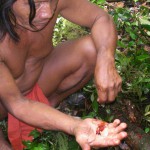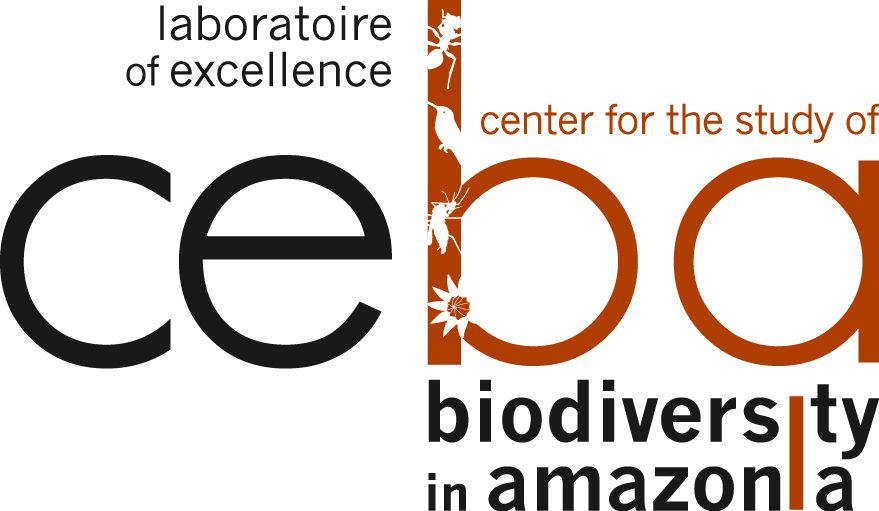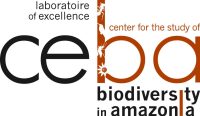science
Tropical forest ecosystems are being converted at a rapid pace for agriculture or urban development, and it is of fundamental importance to understand how this biodiversity contributes to maintaining ecosystem services, how it may provide resources for human welfare, and whether these environmental changes may critically alter this biodiversity.
French Guiana, an overseas Region of France, is an ideal natural laboratory for tropical biodiversity, gathering an unparalleled scientific expertise in the fields of biodiversity research, tropical medicine, tropical forestry, and evolutionary ecology. The combination of scientific excellence with its long-term capacity, CEBA is in a unique position to promote innovative research in the field of biodiversity in Guyana and to act in synergy between academics and stakeholders.
Please click on the figure below to learn more.
biodiscovery
 Only a small fraction of biological diversity has been described thus far. Understanding the way living forms have evolved on our planet is a fundamental scientific challenge, and it is a critical step both in designing conservation programs and to discover new potentially bioactive molecules. Only an intensive survey will make it possible to thoroughly sample the biodiversity in French Guiana.
Only a small fraction of biological diversity has been described thus far. Understanding the way living forms have evolved on our planet is a fundamental scientific challenge, and it is a critical step both in designing conservation programs and to discover new potentially bioactive molecules. Only an intensive survey will make it possible to thoroughly sample the biodiversity in French Guiana.
The CEBA conducts such intensive biodiversity surveys in the aim of understanding the origin of this diversity and the processes by which it is maintained. Novel sampling is combined with datasets collected over the past decades. Biodiversity is characterized both by standard taxonomic methods and through DNA barcoding. For example, the CEBA supports the monitoring of vector insect fauna and virus and parasite reservoirs.
ecological genetics & genomics of adaptation
 The characterization of the mechanisms allowing organisms to acclimate or adapt to a changing environment is central to the science of the CEBA. The study of the biological basis of variation in adaptive traits, of their plasticity and heritability, plays a pivotal role in the project. Functional and genetic diversities determine the adaptive potential of species, and even of species networks.
The characterization of the mechanisms allowing organisms to acclimate or adapt to a changing environment is central to the science of the CEBA. The study of the biological basis of variation in adaptive traits, of their plasticity and heritability, plays a pivotal role in the project. Functional and genetic diversities determine the adaptive potential of species, and even of species networks.
The CEBA addresses the resilience of mating systems to variations in demography and its consequences on long-term population viability. Some of its scientists study the amount of extant adaptation and adaptive potential of species in a varying abiotic and biotic environment.
biodiversity and public health
 The study of emerging or reemerging infectious diseases is a research of foremost relevance in French Guiana. The high diversity of strains naturally occurring in the environment with wild hosts or vectors intersects with a number of key societal issues. Cutting-edge research in this domain will help improving the health of the population in French Guiana, and it should also provide important clues for the management of emerging diseases elsewhere in the tropics.
The study of emerging or reemerging infectious diseases is a research of foremost relevance in French Guiana. The high diversity of strains naturally occurring in the environment with wild hosts or vectors intersects with a number of key societal issues. Cutting-edge research in this domain will help improving the health of the population in French Guiana, and it should also provide important clues for the management of emerging diseases elsewhere in the tropics.
The CEBA contributes to this research through innovative actions and programs. For instance, human pathogens provide an excellent example of pathogenic microbiome within humans. The presence or the emergence / reemergence of pathogens may be expressed differently among the human populations that are affected and this topic is studied both from a clinical and evolutionary standpoints by the CEBA.
ecosystem processes and biodiversity
 To understand how species persist in their habitat, one must be able to assess how they interact with other species, how they withstand harsh climatic conditions and how they use the resources of the environment.
To understand how species persist in their habitat, one must be able to assess how they interact with other species, how they withstand harsh climatic conditions and how they use the resources of the environment.
Over 90% of tropical plant species, for instance, rely on animals for their pollination and/or the dispersal of their seeds. Members of the CEBA also assess the structure and resilience of species networks by measuring interspecific interactions. The CEBA also provides high-quality measures of the physiological response of species to environmental conditions. This research is based on long-term monitoring setups already established in French Guiana to measure forest dynamics and biogeochemical fluxes.
modelling biodiversity in space and time
 Producing scenarios for the future of biodiversity is of crucial importance in Amazonia. The possible futures critically depend on decisions made today and on our capacity of anticipation. Quantitative scenarios based on modeling outputs should play an essential role in policy and management decisions on biodiversity and ecosystem services.
Producing scenarios for the future of biodiversity is of crucial importance in Amazonia. The possible futures critically depend on decisions made today and on our capacity of anticipation. Quantitative scenarios based on modeling outputs should play an essential role in policy and management decisions on biodiversity and ecosystem services.
The CEBA coordinates an effort to build quantitative scenarios for the future of tropical biodiversity. Hypotheses about historical and ecological factors underlying the observed patterns of biological diversity are tested. Models will be used to prioritize the areas for conservation, in part based on ecosystem services such as carbon storage, hydrological and mineral nutrient cycle integrity, and resistance to pest outbreaks.
services of biodiversity
 The CEBA links basic biodiversity science and applications, valuation, and issues of societal concern.
The CEBA links basic biodiversity science and applications, valuation, and issues of societal concern.
It emphasizes the possible applications of newly discovered products derived from organisms, and for training and educating the society to the possible links between practical applications and basic research. As an example, the CEBA offers an opportunity to streamline the testing of potential drugs within French Guiana, through collaborations between chemists, botanists, and physicians. Another major application lays in the valuation of woody forest products, and the CEBA conducts studies to explore the linkage between biodiversity and ecosystem services.

